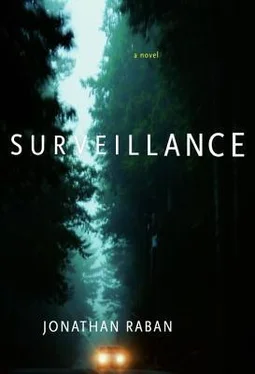Desperate to get rid of him and back to Wilkomirski, she scanned the heaps of old magazines in the corner, where all her published stuff was filed, though nothing there could make much sense to a Chinese parking-lot tycoon. She said, “I wrote a piece about Bill Gates once, a long time ago.”
“Bill Gates, huh? Lemme see.”
She rummaged through a toppling stack and pulled out the old New Yorker from very near the bottom. She stuck a Post-It on the page where her piece began, and handed him the magazine. “There you are. Now—”
But he remained sitting and started to read, scowling at the mass of small print, his lips moving. The piece, even in its eviscerated state, ran to nearly seven thousand words; at this rate, he’d be sitting there forever.
“Wah!” he said, half shout, half whistle. “It say here, ‘Gates told me that…’ You meet Bill Gates?”
“Well, yes, twice. I always meet my subjects.”
“Bill Gates ! You mean you talk to Bill Gates like you talk to me?”
“I spent an hour with him in his office. Then another time he showed me his house.”
“What tips he give you?”
“Tips?”
“Like business tips.”
“We weren’t really talking business. It was more like personal.”
The landlord shook his head slowly in reproach. She’d evidently missed her great opportunity. “How much they pay you to write this?”
“Not enough,” Lucy said in what she hoped was a briskly deterrent tone.
“Like they pay by the hour?”
“No. By the p-p-piece.”
“No benefits?”
“I wish.”
“You ought to read some books.” Now he sounded severe.
“I do.” She gestured at the shelves he’d fastened to the wall.
“Nah. Not storybooks. Good books. You ever read Who Moved My Cheese? That’s a good book. Kind of like a storybook, but different. Lot of tips. Maybe I give you it sometime.”
“That would be nice. Now, please, Mr. Lee…”
At last she succeeded in budging him from his perch. He folded his dirty sheet, gathered his tools into their canvas bag, picked up the New Yorker, and at the door tapped the new lock. “You’re safe now, Lucy.”
“Thank you for taking all this trouble, Mr. Lee.”
“No trouble. Enjoy.” Smiling weirdly, tools in one hand, magazine in the other, he made a stiff little bow, and left.
Fast running out of time, Lucy lunched on a yogurt that was past its sell-by date and returned to the seemingly unconscious fraudster Binjamin Wilkomirski, finding the book increasingly irksome as she plowed through his disordered ragbag of false memories. She was at the point of giving up on it altogether when, in Chapter 12, an odd passage caught her eye. The boy Wilkomirski, now supposedly in a concentration camp, saw a “mountain” of naked women’s corpses. One appeared to have a bit of life in it: a sudden twitchy movement of the stomach.
Now I can see the whole belly. There’s a big wound on one side, with something moving in it. I get to my feet, so that I can see better. I poke my head forward, and at this very moment the wound springs open, the wall of the stomach lifts back, and a huge, blood-smeared, shining rat darts down the mound of corpses. Other rats run startled out of the confusion of bodies, heading for open ground.
I saw it, I saw it! The dead women are giving birth to rats!
The author, who’d spent years in psychotherapy, was clearly on overly familiar terms with Freud, and Lucy saw his disgusting rat story, or rat dream, as evidence only of his distinct talent for morbid fantasy. Yet the passage immediately recalled a bit in Augie’s book. Of course, everything was different: no mountain of bodies, just one male body, naked except for a woolly hat and one sock, sprawled face-down in a German street after a night raid by RAF bombers. Augie wrote that he’d seen a small, wet rat wriggling out of the cleft in the man’s buttocks like an agile four-legged turd.
Where there was war, there were bodies; where there were bodies, there were rats. It was no more than that. Lucy was just new to its ghastly everyday vernacular.

IN MATH CLASS, all Alida could think of was how wrong her algebra was — her human algebra. She’d had little sleep, whiling away the long dark hours first with Agatha Christie, then with The Secret Diary of Adrian Mole, Aged 13¾, unable to lose herself in either. The equation involving her, Tad, and her mom had suddenly, terrifyingly, come apart. Isolate the variable : the variable, the big x, was obviously Augie, though Alida couldn’t begin to figure why. Get every term containing the variable on one side of the equation; then get any term that doesn’t contain the variable on the other side of the equation. Which was a lot easier said than done, because somehow Tad was tied to x, and so were she and her mom. The obvious solution was to eliminate x, but she couldn’t do that because her mom was writing an article about him, and it looked like x would be in their lives for weeks and weeks. She eventually maddened herself to sleep with fruitless variations on this theme, and woke up with a, b, c, and x still jostling furiously in her mind.
Looking across the room she saw her own perplexity reflected in the face of Finn, who was scowling, frowning, scribbling, then wildly staring into space. Finn could be a math genius when he bothered, so he surely wasn’t fazed by the problems set by Mr. Tennyson, which were easy: Alida had worked out all three in less than five minutes. She knew “poor Finn” had his own difficulties with human algebra, so maybe he was working on a baffling equation parallel to her own. Whatever it was, he seemed to be in a state of mental torture, and for the first time ever she found herself actually sympathizing with Finn. Then he caught her eye and pulled his Tasmanian-devil face at her. Boys!
WALKING THE FIVE BLOCKS from the Acropolis to the King County Adminstrative Building on Fourth Avenue, Tad assured himself that he was simply doing what any sensible citizen would do, which was to check out the facts. Besides, he envisioned the Office of Vital Statistics — obviously named by someone with either a good sense of humor or none at all — as a Dickensian warren of musty files and papers, the dead stacked in their hundreds of thousands, maybe millions, organized, alphabetized, at rest. Tad felt he could do with their company for a while — an act of self-mortification that might be good for his soul.
The office was a disappointment, not Dickensian at all, just the usual motley of computer terminals, copiers, microfilm viewers. The dead — at least, the recently dead — had gone digital and couldn’t lend Tad the solace of their society.
He filled in the form, stating his Reason for Inquiry as “genealogical research.” He wrote in the name of Charles Ong Lee, his date and place of death (November 25, 1999, in Seattle), paid $17.50 in cash, and ten minutes later was in possession of a copy of the certificate. Here was the unlucky social worker. “Cause of Death: blunt trauma to head and torso incurred in single-vehicle automobile incident.” He hadn’t gone far in his life, this Mr. Lee. Born in Tacoma on February 13, 1974, he’d traveled about forty-five miles north to Shoreline, then met his death on the road between the two.
Tad folded the certificate and put it in his wallet. Heading back to the apartment, he resolved to take his time before making his next move, which would need more rehearsal and stagecraft than he could possibly manage on this gray, penitential morning. As he walked, he muttered to himself, “Eliminate the sins and hindrances that I have accumulated by disparaging the Dharma since the beginningless past. Eliminate the sins and hindrances. Eliminate the sins and hindrances….” It sort of seemed to work.
Читать дальше













